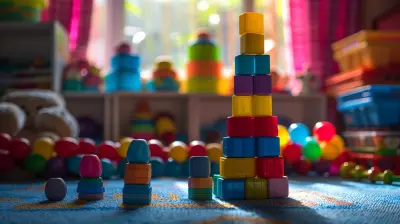Why It's Important to Let Siblings Work Through Conflict
23 August 2025
If you’re a parent of more than one child, you’ve probably played referee more than you’d like to admit. One minute the kids are building blanket forts and laughing their hearts out, and the next minute they’re in a full-blown shouting match over who gets the red crayon. It’s tempting to jump in and solve the issue for them. After all, peace and quiet sound pretty nice, right?
But here’s the twist: letting siblings work through conflict on their own can actually be one of the best gifts you give them.
Let’s look at why that is—and how stepping back (just a bit) might do more good than stepping in.
The Natural Tug-of-War: Sibling Conflict Isn’t Always Bad
First off, conflict between siblings is totally normal. It’s as natural as peanut butter sticking to the roof of your mouth. Growing up together means sharing space, toys, time, and attention. It’s no wonder they butt heads.But conflict also presents a golden opportunity for growth. When siblings argue, they’re not just being “mean” or “difficult”—they’re figuring out boundaries, practicing how to express their needs, and testing out problem-solving strategies.
Kind of like a mini life workshop… with yelling.
The Hidden Upside: What Kids Learn from Conflict
So, what exactly are kids learning when they tussle over toys or take jabs at each other during dinner? More than you might think.1. Communication Skills
When kids argue, they’re learning to say what they feel (even if it’s not always pretty). They practice articulating thoughts, defending their viewpoints, and—eventually—listening to the other side.Over time, kids begin to understand that yelling might get attention but not results. They start to see the value in using their words… and using them better.
2. Emotional Regulation
It’s easy for kids to get swept up in emotion when they don’t get their way. But dealing with a sibling helps them confront feelings like anger, jealousy, and frustration up close.By working it out, they gradually learn to manage those emotions instead of letting them explode like a shaken soda can.
3. Empathy and Perspective-Taking
Nothing builds empathy like having to live with the same person who just snatched your toy. When kids are encouraged to solve problems between themselves, they're more likely to consider the other person’s feelings.Isn’t that the first step to raising kind, considerate humans?
4. Negotiation and Problem-Solving
Sharing space teaches kids to compromise. When they settle a conflict without adult interference, they’re negotiating in real terms. Sometimes they’ll trade off toys. Sometimes they’ll set a timer. Sometimes they’ll just walk away and cool off.Whatever they decide, they’re creating solutions—and that’s one heck of a life skill.
The Danger of Constant Interference
Look, we all want a peaceful household. But jumping in every time siblings squabble isn’t always helpful. In fact, it might backfire.❌ Undermines Self-Reliance
When parents always play peacekeeper, kids may start depending on someone else to solve their problems. That stunts growth.It’s like giving a kid training wheels and never taking them off—they won’t learn to balance on their own because they never get the chance.
❌ Creates Resentment
If one child feels like the parent always sides with their sibling (even unintentionally), it can lead to bitterness. The "golden child" narrative starts brewing, and no one wants that kind of drama unfolding at the dinner table.❌ Blocks Emotional Growth
Conflict isn’t comfortable. But it teaches resilience. If we shield kids from every hard moment, they don’t get to build those critical emotional muscles. They miss the chance to learn that they can deal with something tough… and come out stronger on the other side.
Okay, So Should I Just Let Them Fight It Out?
Not exactly. Letting siblings work through conflict doesn’t mean turning a blind eye or ignoring harmful behavior. Think of it more like being a coach rather than a referee. You guide from the sidelines, but you don’t jump on the field every time someone fumbles.Here’s how to support healthy sibling conflict without micromanaging:
How to Encourage Healthy Conflict Resolution
👂 Listen First, Jump in Later
When you hear shouting or arguing, resist the urge to immediately intervene. Give it a minute. Often, they’ll work it out themselves.If things escalate, then step in—but not to fix it for them. Instead, help them unpack what happened.
Ask open-ended questions like:
- "What were you feeling when that happened?"
- "What do you think your brother/sister was feeling?"
- "How could we handle this differently next time?"
Questions like these encourage reflection instead of blame.
🤝 Teach Conflict Tools (Before They Need Them)
Prevention is powerful. Teach your kids simple tools for resolving conflict before the next fight breaks out.Tools like:
- Taking turns
- Using “I feel…” statements (“I feel mad when you take my toy without asking.”)
- Walking away to cool down
- Asking for a do-over
Role-playing can also help. Try practicing scenarios together when things are calm. It may feel a little cheesy, but it works.
📏 Set Ground Rules
Not all conflict is okay. Hitting, name-calling, or bullying should never be swept under the rug in the name of “working it out.”Let your kids know there are boundaries. Disagreeing is fine. Disrespect is not.
Create clear family rules for behavior during disagreements—and stick to them.
When to Step In (And How to Do It Right)
Sometimes, you do need to get involved. If a situation becomes physically or emotionally unsafe, don’t hesitate to intervene.But avoid lecturing or assigning blame. Instead, be a neutral guide.
For example, you might say:
- “I see that you’re really upset. Let’s take a break and talk about this in a few minutes.”
- “Let’s each share what happened, one at a time, and then we can figure out how to fix it.”
Your goal isn’t to solve the problem—it’s to equip them to solve it.
Sibling Conflict Builds Lasting Bonds (Yes, Really)
It might sound ironic, but the very fights that drive you crazy now could be what brings your kids closer in the long run.When siblings learn to work through their differences, they learn trust. They learn that they can survive arguments, forgive, and still care about each other.
That kind of relationship is deep-rooted—the kind that can last a lifetime. And isn’t that what we want for our kids?
So… What Should You Do Next Time the Fighting Starts?
Take a breath. Remember the big picture. Conflict isn’t just noise to be silenced—it’s a stepping stone to maturity.Let your kids navigate those rough moments. Support them with tools, empathy, and structure. But don’t try to carry the whole thing for them.
Because when you let siblings work through conflict, you’re not just solving a squabble—you’re building adults who can think, feel, and connect better with the world.
And that? That lasts way longer than who got the red crayon.
Final Thoughts: Trust the Process
Parenting is messy. There are no magic formulas. But when it comes to sibling conflict, a little space can go a long way.So next time the tension rises and you’re tempted to mediate every fight, pause for a second. Ask yourself: “Is this something they can figure out on their own?”
More often than not, the answer is yes.
And that moment of trust may just be the secret sauce that helps your kids grow into the kind, resilient, emotionally intelligent humans you’re hoping they become.
all images in this post were generated using AI tools
Category:
Sibling JealousyAuthor:

Austin Wilcox
Discussion
rate this article
1 comments
Kara Forbes
In a world where harmony often overshadows growth, allowing siblings to navigate their own conflicts can unlock hidden strengths. It’s in the throes of disagreement that bonds deepen, resilience is forged, and life lessons unfold—if only we step back and let them.
September 22, 2025 at 3:05 AM

Austin Wilcox
Absolutely! Allowing siblings to resolve their own conflicts fosters resilience and strengthens their bonds, paving the way for valuable life lessons.


